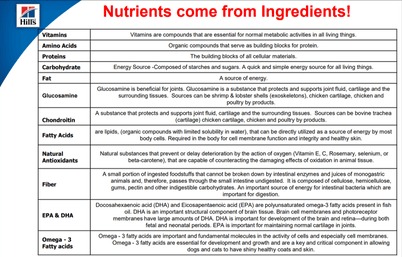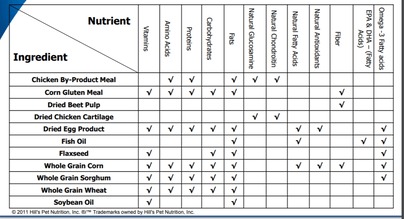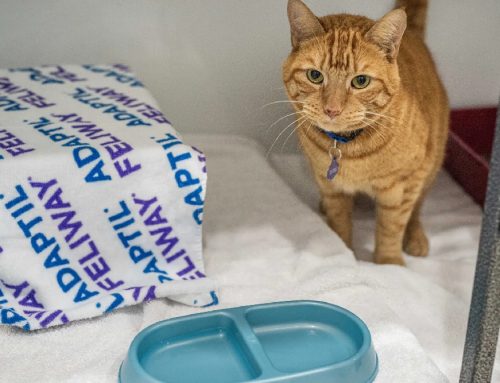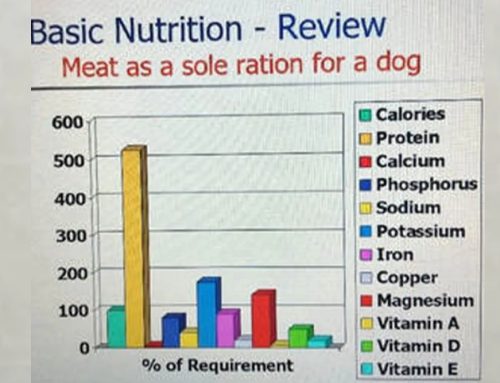PET NUTRITION: THINK ABOUT NUTRIENTS NOT JUST INGREDIENTS
As pet owners we all want the same thing: to feed our pet a healthy, complete diet to promote a long and happy life.
A big part of choosing the right diet for your pet is being able to accurately interpret the label on the back of the bag. You can’t assume a pet food is right for your pet by simply reading the ingredient list, because the nutrients are just as important as the ingredients!
Key tip: Consider nutrients as well as ingredients!
Now, lets compare the following two labels.
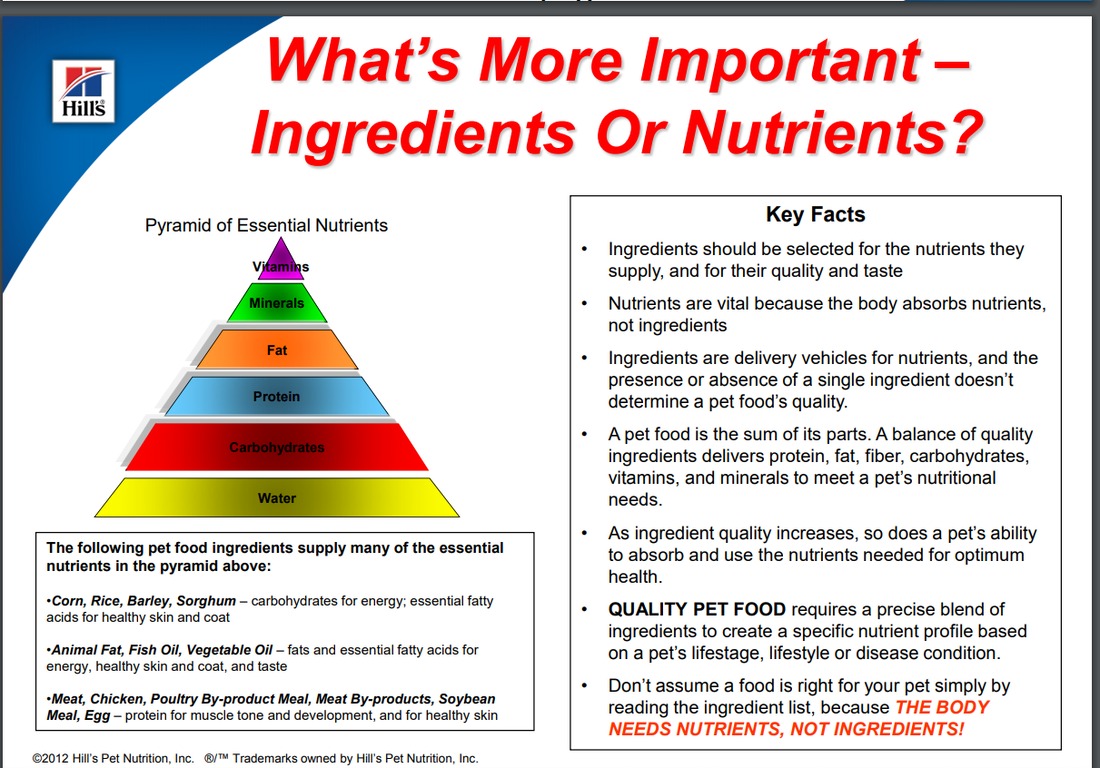
At a glance, the pet store diet definitely looks much more appealing, whole foods, vegetables … it looks better than some of us eat! But remember, the pet food industry is not as regulated as it appears. Few pet food companies actually have a licensed veterinary nutritionist on their team, which is likely the reason why we are now seeing the emergence of nutritional based illnesses such as Dilated Cardiomyopathy which is linked to grain free, raw and exotic protein diets (visit this blog post post on DCM).
A high quality pet food requires a precise blend of ingredients to meet a specific nutrient profile based on a pet’s life stage, lifestyle or disease condition. This is the advantage to choosing a diet that has been formulated by a licensed veterinary nutritionist. They ensure that these nutrients are delivered to your pet in the right ratios for their stage of life.
That being said we still need to understand the ingredients list.
Ingredient List for Diet A, formulated by a company with a veterinary nutritionist ie Hills, Royal Canin, Raynes, Purina
Brewers Rice, Whole Grain Corn, Chicken By-Product Meal, Powdered Cellulose, Pork Fat, Soybean Mill Run, Lactic Acid, Chicken Liver Flavor, Soybean Oil, Calcium Sulfate, Potassium Chloride, L-Lysine, Iodized Salt, Choline Chloride, vitamins (Vitamin E Supplement, L-Ascorbyl-2-Polyphosphate (source of Vitamin C), Niacin Supplement, Thiamine Mononitrate, Vitamin A Supplement, Calcium Pantothenate, Vitamin B12 Supplement, Pyridoxine Hydrochloride, Riboflavin Supplement, Biotin, Folic Acid, Vitamin D3 Supplement), minerals (Ferrous Sulfate, Zinc Oxide, Copper Sulfate, Manganous Oxide, Calcium Iodate, Sodium Selenite), Taurine, Mixed Tocopherols for freshness, Natural Flavors, Beta-Carotene
Ingredient List for Diet B, pet store brand without registered veterinary nutritionist
Deboned chicken, deboned turkey, chicken meal, whole green peas, whole red lentils, whole pinto beans, chicken liver, chicken fat, catfish meal, chickpeas, whole green lentils, whole yellow peas, lentil fiber, eggs, pollock oil, natural chicken flavor, chicken heart, turkey liver, turkey heart, chicken cartilage, chicken gizzard, turkey gizzard, salt, mixed tocopherols (preservative), dried kelp, whole pumpkin, collard greens, whole carrots, whole apples, zinc proteinate, freeze-dried chicken liver, freeze-dried turkey liver, calcium pantothenate, riboflavin, vitamin A acetate, chicory root, turmeric, sarsaparilla root, althea root, rose hips, juniper berries, dried lactobacillus acidophilus fermentation product, dried bifidobacterium animalis fermentation product, dried lactobacillus casei fermentation product.
Here are the most common questions we hear pet owners ask:
Diet B contains pumpkin, herbs and berries, doesn’t that make it a better diet?
Marketing based companies are good at coming up with “feel good” names. Remember that ingredients are listed in the order of highest weight to lowest weight, in most cases those “berries” amount to one berry per bag.
What exactly is “by-product meal”?
The term “by-product” has been created because they are the parts of the animal our society does not typically consume, such as the animal’s organs. These parts of the animal are still nutritious. Various parts of the animal such as their meat, liver and internal organs are ground into meal, much of the fat is extracted, and the bone residue (ash) is reduced. This results in a high quality, concentrated source of protein which is also very tasty to both dogs and cats.
Chicken by-product meal consists of ground, rendered, wholesome parts of the chicken. It includes white meat, dark meat, liver and internal organs.
Meat by-product consists of the non-rendered, clean parts, other than meat from slaughtered mammals that do not include hair, horns, teeth and hoofs. These diets specifically use beef or pork lungs, spleens, or livers in their diets for consistency and optimal nutrient profile.
Poultry by-product meal includes white meat, dark meat, liver and organs from turkey, duck and chicken.
Do they put inferior parts of the animals in by product meal?
Do not worry! By-product meal does not use chicken feet, beaks, hair, hooves, teeth, nails etc as these are very low in nutritional quality. An indicator of this can be the mineral content of any commercial food (it should be lower vs higher which would indicate bone content of the diet). The ingredients that are used are organ meat such as lungs, heart, liver etc. These are high quality by products that are bone free and lower in mineral content.
The pet store assured me this is a very high quality diet. It is also very expensive. Don’t they have a veterinary nutritionist formulating the diet?
Veterinary nutritionists are veterinarians who have undergone a medical specialization in all things related to your pet’s dietary needs. Surprisingly, veterinary nutritionists are few and far between. Research the company making your dog’s food, and find out who has formulated the recipes. Make sure that a veterinary nutritionist is the one formulating all recipes, so you know your dog will be receiving an optimal diet.
Veterinary nutritionists focus on the nutrients derived from the ingredients used and how these benefit your pet. For example carrots and blueberries are healthy, but if we only ate these two things all the time, we would not be able to get the proper nutrients to fuel our bodies or help disease states. This is why we need to think about nutrients as well as ingredients when selecting a dog food.
Nutrients and high quality ingredients are both important in a pet food. But nutrients are what your pet’s body absorbs, not ingredients. The optimum food is made of quality ingredients selected for nutrients, quality and taste precisely formulated to deliver the correct amount of protein, fat, carbohydrates, fibre, vitamins and minerals to meet the pet’s nutritional needs. A pet food is a sum of it’s parts.
As your pet’s primary health care provider, we are here to help you choose the right diet for your pet. If you have any questions about your pet’s diet. Please contact us at 905 208 9933 or email reception@macvets.com
Click the image below for a larger version of the image.
